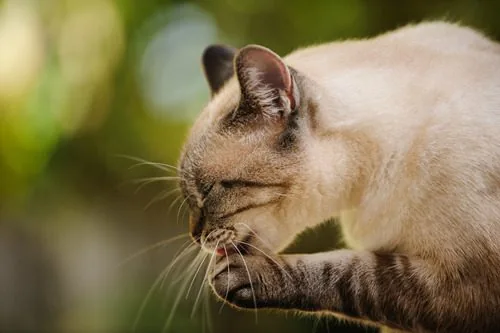Cat Licking: What’s Behind This Common Feline Behavior?
Cat licking is a common behavior that intrigues many cat owners. Understanding why your cat engages in this activity can help you foster a deeper connection with your feline friend and ensure their well-being. In this article, we will explore the various reasons behind cat licking, from grooming to stress relief, and what it means for your cat’s health.

Grooming: The Primary Reason for Cat Licking
Cats are known for their meticulous grooming habits. Grooming is the most common reason for cat licking and plays a vital role in maintaining their health. Through licking, cats remove dirt, debris, and loose hair from their fur, which helps keep their coat clean and free of parasites.
Self-Cleaning Mechanism
Cat licking serves as a self-cleaning mechanism. The rough texture of a cat’s tongue, covered in tiny hook-like structures called papillae, is perfect for removing loose fur and debris. This self-grooming process not only helps maintain cleanliness but also spreads natural oils across their fur, keeping it soft and healthy.
Temperature Regulation
Grooming helps cats regulate their body temperature. By licking themselves, cats can cool down on a hot day. The saliva on their fur evaporates, providing a cooling effect. This behavior is particularly noticeable during the warmer months when cats may increase their grooming frequency.
Cat Licking as a Form of Affection
Cats also lick to show affection and strengthen social bonds. This behavior is often seen in multi-cat households, where cats groom each other as a sign of trust and companionship. When your cat licks you, it can be a sign of affection, indicating that they consider you a part of their family.
Mutual Grooming Among Cats
Mutual grooming, known as allogrooming, is common among cats that have a close bond. It helps them reinforce their social hierarchy and build strong relationships. Allogrooming can also be a way for cats to comfort each other, particularly in stressful situations.
Licking as a Sign of Trust
When your cat licks you, it’s a gesture of trust. Cats that feel secure and comfortable with their owners often show this through licking. It’s their way of expressing love and building a stronger connection with you.
Stress and Anxiety
While licking is a normal behavior, excessive licking can indicate stress or anxiety. Cats may lick themselves excessively as a coping mechanism to deal with changes in their environment, boredom, or underlying medical issues.
Identifying Excessive Licking
Excessive licking can lead to hair loss, bald spots, and skin irritation. If you notice these signs, it’s essential to observe your cat’s behavior and environment. Identifying the triggers that cause stress can help address the underlying issue and reduce excessive licking.
Potential Triggers of Stress
Several factors can trigger stress in cats, including changes in their routine, introduction of new pets, or unfamiliar environments. Providing a stable and predictable environment, along with plenty of mental and physical stimulation, can help alleviate stress-related licking.
When to Consult Your Veterinarian
In some cases, cat licking can be a symptom of an underlying medical condition. Skin allergies, parasites, and infections can cause itching and discomfort, leading to increased licking. If you notice any unusual licking patterns or signs of discomfort, it’s important to consult your veterinarian.
Skin Allergies and Irritations
Allergies to food, pollen, or other environmental factors can cause skin irritations, leading to excessive licking. Identifying and addressing the source of the allergy can help manage this behavior.
Parasites and Infections
Parasites such as fleas and mites can cause significant discomfort, leading to constant licking and scratching. Regular check-ups and preventive treatments are crucial to keeping your cat free from parasites.
The Role of Diet in Cat Licking
A balanced diet plays a crucial role in your cat’s overall health, including their grooming habits. Nutritional deficiencies can affect their skin and coat health, leading to excessive licking.
Importance of a Balanced Diet
Providing your cat with a balanced diet rich in essential nutrients helps maintain their skin and coat health. Omega-3 and Omega-6 fatty acids, in particular, are vital for a healthy coat and can reduce excessive licking caused by dry, itchy skin.
Hydration and Its Impact
Ensuring your cat stays hydrated is equally important. Dehydration can lead to dry skin, increasing the likelihood of excessive licking. Make sure your cat has access to fresh water at all times.
Reducing Excessive Licking Through Stimulation
Providing your cat with mental and physical stimulation can help reduce stress-related licking. Interactive toys, regular playtime, and environmental enrichment can keep your cat engaged and reduce the likelihood of excessive grooming.
Interactive Toys and Games
Interactive toys that stimulate your cat’s natural hunting instincts can provide mental and physical exercise, reducing boredom and stress-related behaviors.
Environmental Enrichment
Creating an enriching environment with scratching posts, climbing structures, and hiding spots can help keep your cat active and engaged. Regular play sessions can also strengthen the bond between you and your cat, reducing anxiety and excessive licking.
Promoting Your Cat’s Well-Being Through Understanding and Care
Understanding the reasons behind cat licking can help you better care for your feline friend. Whether it’s grooming, showing affection, or dealing with stress, recognizing the underlying causes can ensure your cat remains healthy and happy. If you have concerns about your cat’s licking behavior, consulting with a veterinarian at St. Paul Pet Hospital can provide you with the guidance and support you need. Call us at (651) 789-6275 to schedule an appointment and ensure your cat’s well-being.

